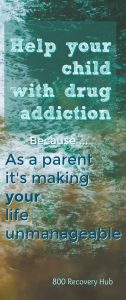The Heartbreaking Struggle When You Child is A Drug Addict
As a parent, it is your role to take care of your child. But, what do you do when you need to help your child with drug addiction? The best thing you can do is guide them to a solution that includes treatment or detox. If your loved one wants to get clean and sober, then help them get into a rehab. But what if you are not sure they are addicted to drugs …or what if they don’t want help…
Signs of Drug Addiction
If your teen or adult child starts behaving differently for no apparent reason––such as acting withdrawn, frequently tired or depressed, or hostile—it could be a sign that they are developing a drug-related problem.
Parents and others may overlook such signs, believing them to be a normal part of the growing-up process.
Through scientific advances, we know more than ever before about how drugs work in the brain. We also know that addiction can be successfully treated to help people stop abusing drugs and lead productive lives. Jump in early when you first spot signs of drug use.
Why can’t some people stop using drugs on their own?
Repeated drug use changes the brain. Brain-imaging studies of people with drug addictions show changes in areas of the brain that are critical for judgment, decision-making, learning, memory and behavior control. Quitting is difficult, even for those who feel ready. Keep in mind that drug-induced changes in the brain may also have behavioral consequences. These include the compulsion to use drugs despite adverse consequences. Long-term drug use results in significant changes in brain function that persist long after the individual stops using drugs. Many of these consequences can be reversed if the person gets treatment and remains sober.
If my child refuses to cooperate, should the family conduct an intervention?
People of all ages with substance use disorders live in fear of what will happen if their drugs are taken away. You can ensure your loved-one that professional treatment centers will keep them safe and as comfortable as possible – especially if a detoxification process is needed.
Be sure to let them know that family and loved ones will stand by and offer loving support. Warning: addicts commonly “change their mind” after a few days of treatment. Parents should pay no attention to this. It is just the disease talking.

1-855-DRUGFREE or 1-855-378-4373
What do I look for in a treatment center for this age group?
Treatment approaches must be tailored to address each patient’s substance abuse patterns and related medical, psychiatric, and social problems. Some treatment centers offer outpatient treatment programs. However, most people do better in inpatient (residential) treatment. An addiction specialist can advise you on your best drug rehab options.
How do we keep things stable in the meanwhile?
First, talk to your loved one. There are ways to have a conversation about drugs or other sensitive issues that will prevent a fight. Acknowledge your child’s opinions but know that many people with substance abuse problems are afraid and ashamed and might not tell the truth. This is why it is important to involve medical professionals who have experience working with people struggling with substance abuse issues.
I have heard that people who use drugs could be “self-medicating” because they feel depressed – How do we handle that problem as well?
It’s possible your child needs to find treatment for both depression and addiction. This is very common. It is called dual-diagnosis “comorbidity” or “co-occurrence” when you have more than one health problem at the same time. Parents should encourage their children to tell all of their health care providers about all of their symptoms and behaviors.
There are many non-addictive drugs that can help with depression or other mental health issues. Sometimes doctors do not communicate with each other. So, make sure all relevant  healthcare providers know about all of your child ’s health issues. Your child should be treated for all health issues at the same time.
healthcare providers know about all of your child ’s health issues. Your child should be treated for all health issues at the same time.
If your child ever feels so depressed that you think he or she will hurt themselves there is a hotline you or your child can call. The National Suicide Prevention Lifeline’s number is 1-800-273-TALK (8255.) You are also welcome to call it to discuss your child’s symptoms and get advice on how to best handle the situation.
My child’s addiction is making my life unmanageable. What now?
Take care of yourself, as a parent! Remember you are trying to help your child with drug addiction. This is stressful! Ask yourself the following questions and answer them as honestly as you can:
- Do you find yourself making excuses, lying or covering up for your child/spouse/friend?
- Do you have a reason not to trust your child/spouse/friend?
- Is it becoming difficult to believe his/her explanations?
- Do you lie awake worrying about him/her?
- Is he/she missing school/work often, without your knowledge?
- Is your spouse missing work and the bills piling up?
- Are the savings mysteriously disappearing’?
- Are the unanswered questions causing hostility and undermining your marriage’?
- Are you asking yourself, “What’s wrong?” and “Is it my fault?”
- Are your suspicions turning you into a detective, and are you afraid of what you may find?
- Are normal family disagreements becoming hostile and violent?
- Are you canceling your social functions with vague excuses’?
- Are you becoming increasingly reluctant to invite friends to your home?
- Is concern for your spouse, child or friend causing you headaches, a knotty stomach, anxiety?
- Is concern for your spouse, child or friend easily irritated by minute matters? Does your life seem a nightmare’?
- Are you unable to discuss the situation with friends or relatives because of embarrassment?
- Are your attempts at control frustrating?
- Do you overcompensate and try not to make waves?
- Do you keep trying to make things better and nothing helps?
- Are the lifestyle and friends of the loved one changing? Do you ever think that they may be using drugs?
If you have answered “YES” to four or more of these questions, Counseling, Al-Anon, NAR-ANON or Therapy may be able to assist you with the answers that you are looking for.
If you need to put your child into a treatment program, we can guide you through the process.
SaveSave
SaveSave
SaveSave
SaveSave
